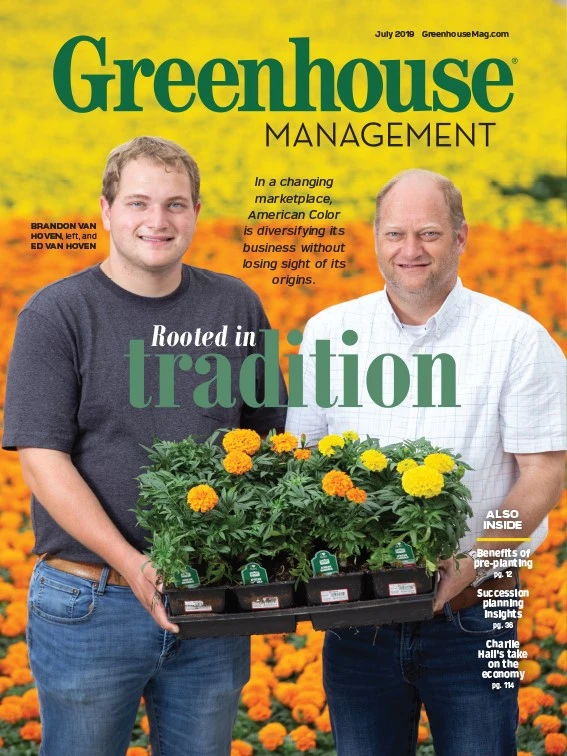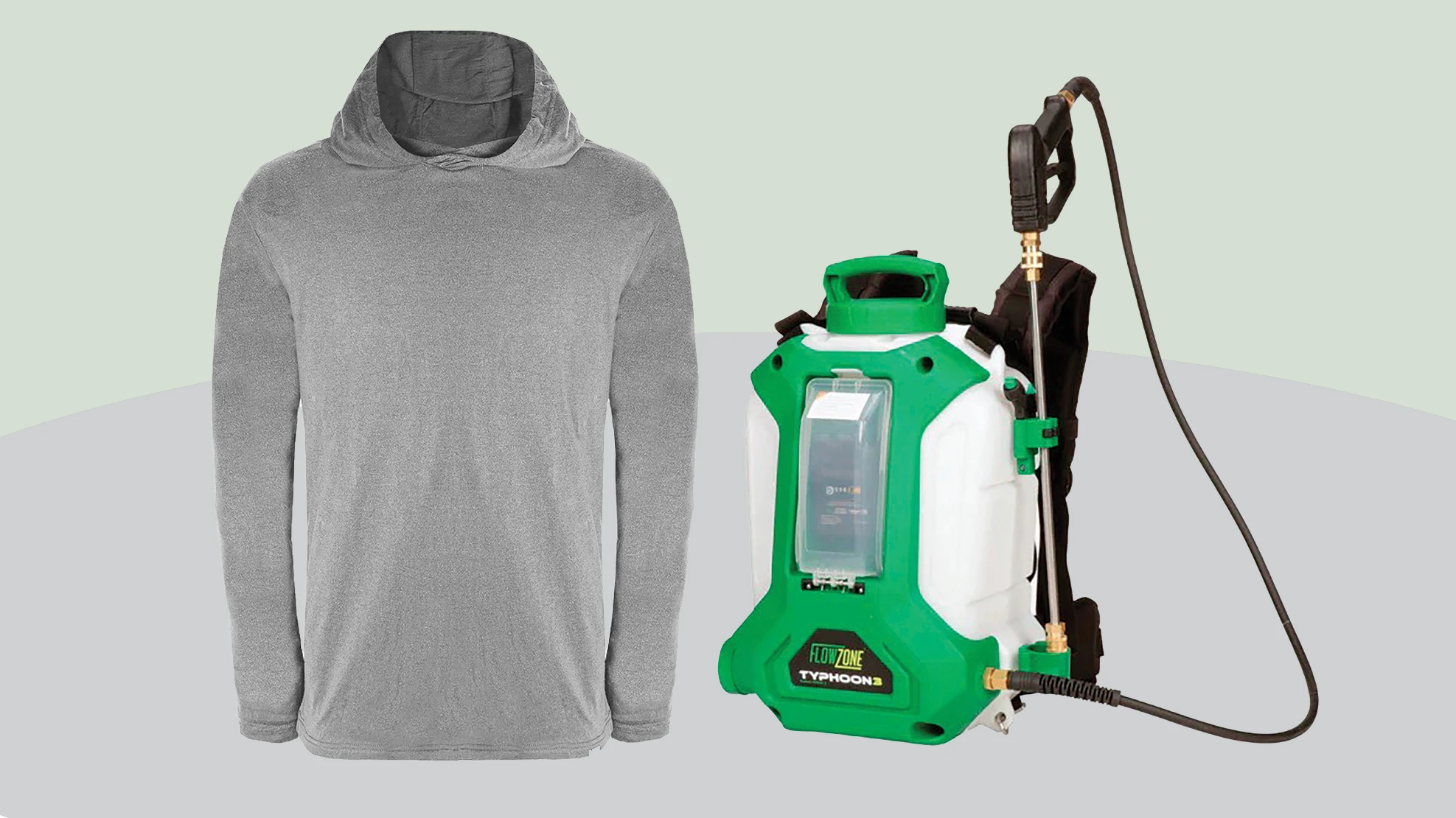

When someone brings an idea or issue to Dale Deppe’s attention, they’re met with questions. A lot of questions, but thoughtful ones. As founder of Spring Meadow Nursery in Grand Haven, Michigan, Dale built the nursery to an international success by taking an unconventional approach to problem solving.
Those closest to Dale call him a “contrarian” leader — one whose goal is to “come in from a different angle,” says Jeremy Deppe, Spring Meadow’s GM and Dale’s son.
“He challenges us to move the needle every day in every area,” Jeremy says.
His assiduous methods led him to coin a phrase that’s uttered anytime something is discussed or implemented, from a production process to a new marketing strategy — “It’s a good start.”
The phrase keeps his team focused to build on their successes and not to stop just because something worked well.
“Dale always says ‘It’s a good start’ because the bar keeps getting raised,” says Tim Wood, product development and marketing manager at Spring Meadow. “The product or the process can always be better. Just take one step forward and then another. That’s how you get to your goals — by taking one step at a time, never stopping to rest or sit on your laurels.”
Dale asks of everyone in the company, including himself, “What are you going to do today?” Don’t worry about yesterday — that day has come and gone, he says.


“It’s amazing what a business or a person can do when they choose to do something every day,” Dale says.
His goals and expectations allow the nursery to plan for double-digit sales growth each year.
Dale’s leadership approach was molded after years of experiences and lessons from rounds of successes and failures in nursery management and during the peaks and valleys of the economy.
Dale graduated from Michigan State with a horticulture degree and swiftly landed a job as a propagator at Zelenka Nurseries in Grand Haven. Zelenka was a large nursery that enjoyed the rewards of an expanding nursery market. Zelenka hired several contract growers to keep up with the demand for nursery product. Dale became a contract grower for his employer working nights and weekends to produce shrubs on a 20-acre tract he had recently purchased. When the shrubs were retail-ready size, he potted them and delivered them back to Zelenka’s dock.
“I was an energetic young man, working night and day on both jobs and the market was good,” he says. “I built a house on the 20 acres, brought my first crop to Zelenka and bought another 40 acres down the road thinking I’d do more contract growing.”
Three months after closing on the new property and 11 years after hiring on at Zelenka, the economy took a dive and Dale was laid off. It was 1981 and the United States was in a recession, but Dale and his bride Liz persevered. They sold the 40 acres and Liz found a job so Dale could pursue plant sales from their 20 acres.
“I built a greenhouse that summer basically out of junk and set up a mist system. I figured out how to sell the first crop in the greenhouse and the next spring I built three more greenhouses and continued to expand,” he says.
He started selling shrub liners in a potted cell, much like annuals were grown and sold, while his competitors were selling bareroot liners. Dale was selling out of plant material, but he wasn’t making any profits.
“I used to think in order to get a customer, I had to sell plants cheaper than the guy down the road. I was working 12 hours a day trying to make this work, but I wasn’t making any money,” he says. “I was selling generic plants like everyone else and I couldn’t get the prices I needed. I learned to raise my prices every year to cover my costs. It was a progression. Next, I started looking for plants that were different from what others were selling. I bought plants from all over the world and introduced them into the U.S.”
However, he faced a roadblock in that situation, as well.
“These were still generic plants. My key customers would buy those plants once or twice and then start to propagate them on their own,” he says. “To address that, I hired Tim Wood as a plant hunter because I wanted to sell patented plants. And that was my label for him. I told him plant hunting was his full-time job.”
That was 20-plus years ago.
“About the only patented shrubs on the market back then were blue hollies,” he says. “Lots of roses were being patented and there were a lot of patented trees, but not many shrubs.”




A foray into branding
Some early adopters inspired Dale to pursue patented shrubs.
“People like Jim Zampini at Lake County Nursery were using patented plants and parsing them out to protect their market. They were maintaining good price points by limiting the amount of plants in the market,” he says. “Looking at my future and the future of the nursery market, I decided to go at the market with a frontal attack and find my own plants to patent.”
Dale first patented Weigela Wine & Roses followed by Little Henry sweetspire.
“I started licensing right away. When I patented my first plant and negotiated my royalty stream with the breeder, I decided one-third of the royalty stream would go to a marketing fund. We still do that today,” he says. “Around the same time, Anthony Tesselaar charged a royalty fee of $2 or $3 for the Flower Carpet Rose. It really woke up the nursery industry.”





By 1999, the ColorChoice brand was born.
For the next few years, Spring Meadow expanded its licensee group while Dale began to look for partners in the industry to help transition the wholesale brand into a consumer brand. In 2004, Spring Meadow joined with Proven Winners and launched Proven Winners ColorChoice Shrubs.
“I’d see Proven Winners annuals ads in magazines, and [Proven Winners founder] Tom Smith is down the road a couple of hours,” Dale says. “Ironically, we found out they were also investing a percentage of their royalty income into a marketing fund.”
The companies formed a partnership with a long-term contract and Spring Meadow retains exclusive rights to select, develop, distribute and market shrubs under the Proven Winners brand.
“Dale was instrumental in driving the push into branding as a way to differentiate from commodities,” Jeremy says. “Branding has provided a way for each part of the supply chain to add value and introducing new varieties has made gardening easier for consumers.”
Dale says brands are critical to the health of the nursery market and doesn’t see it as a “battle of the brands.”
“Branding has changed the profitability of the customers we deal with, and that’s one of the things I’m most proud of,” he says. “Branding has elevated the price point at every stop of the supply chain. There’s no question that branding has changed the industry forever. It gives people hope.”
Prior to the partnership, Spring Meadow already had a marketing team. And now with the branding agreement in its 15th year, Spring Meadow continues to fund its own advertising.
“When you see an ad for shrubs, Spring Meadow created that and paid for it,” Dale says.
Bountiful giver
Dale’s fortitude didn’t stop at branding or even with his own company.
“He has donated his time to many industry boards and committees with a goal of clarifying their mission and making the necessary changes to get closer to achieving those missions,” Tim says. “In most cases, it wasn’t what people wanted to hear, but in the end, those that served alongside him appreciated the journey and strides that were made.”
He’s been a member of the International Plant Propagators’ Society since he was 20 years old. He’s a champion for the Horticultural Research Institute, where he and Liz created a scholarship fund in 1999. The Spring Meadow-Proven Winners Endowment Fund topped $800,000 last year and a total of 30 Spring Meadow-Proven Winners endowed scholarships have been awarded to students since 2004. Liz and Dale believe that bright, well-trained, qualified people are essential to the green industry and that backing motivated students plays a vital role in protecting and growing the industry. Through HRI, the AmericanHort Foundation acts as the administrator of endowments that help students to obtain the education necessary to successfully pursue horticultural careers.
“Our team has been blessed by this industry and the mentors who’ve helped us along the way. These scholarships represent our commitment to continue the encouragement of emerging professionals,” he says. “We are pleased to be able to support these students in such a direct way.”
Besides scholarships, the endowment also provides funds to HRI to support research that represents a return on investment for the green industry.
“I am amazed how caring he can be. He does not talk about it, but he is all about sharing his blessing with others,” Tim says. “He shares the credit, he shares his time, he shares his ideas and he shares his profits. For example, Spring Meadow pays out management bonuses every six months based on profits and merit. In addition, 10% or more of our profits are given to charities. He cares about people and you can see it in his actions. He cares about his customers and finds ways to make them successful. ‘Seek and Share’ is the IPPS motto and he lives it.”
When Tim approached Dale with the idea of raising money for breast cancer research through the sales of Invincibelle Spirit Hydrangea, Dale made a goal to raise $1 million and insisted the nursery hire a full-time person to make it happen.
Last year, Spring Meadow surpassed its million-dollar fundraising goal which benefits the Breast Cancer Research Foundation (BCRF). Since 2009, the Invincibelle Spirit Campaign has supported BCRF by donating one dollar for every Invincibelle Spirit and Invincibelle Spirit II hydrangea sold, as well as through Pink Day cause marketing events, which are hosted by independent garden centers across North America.

Explore the July 2019 Issue
Check out more from this issue and find your next story to read.
Latest from Greenhouse Management
- The Growth Industry Episode 3: Across the Pond with Neville Stein
- A nation of gardeners: A history of the British horticulture industry
- How Izel Native Plants is solving the native plant conundrum
- Trends: Proven Winners 2025 perennial survey shows strong demand
- Online registration opens for 2025 Farwest Show
- Cashing in with customization
- The Ball Seed Difference
- Lawsuit challenges new H-2 visa rules






